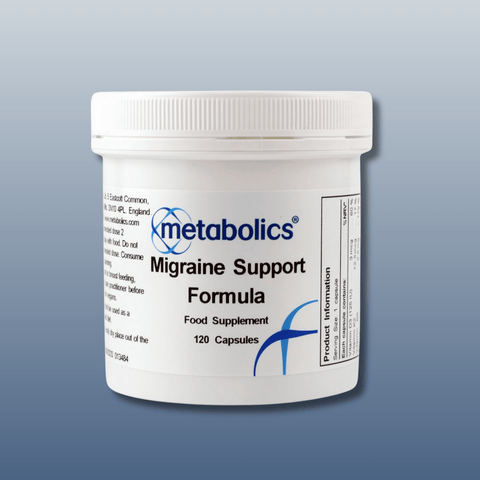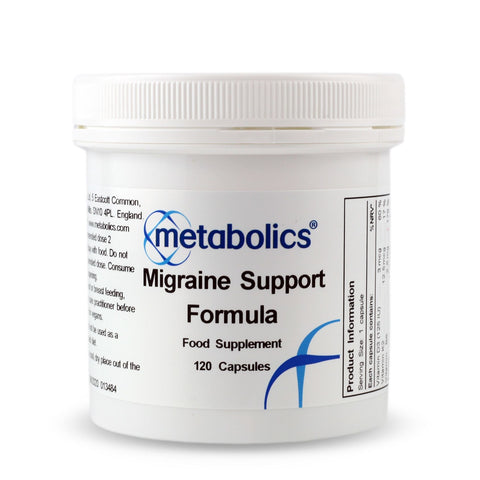Suitable For
Migraine Support Supplement
Migraines occur when the brain energy metabolism has been found to be abnormal and the brain becomes hypersensitive to many stimuli that can trigger an attack. The biochemical imbalances occur not only in the brain, but are detected in platelets in the blood and muscle.
The International Headache Society classifies migraines with or without auras:
Migraines have stages of varying length and severity:
A variety of triggers may be involved with migraine, including emotional shock, trauma or tension, physical tiredness, lack of sleep, or low blood sugar. Dietary factors such as tea, coffee, chocolate, cheese, alcohol or dehydration may also set off a migraine. Environmental factors such as flickering or bright lights, loud noises or strong odours, as well as certain medications and hormonal triggers, may also be involved.
One of the causes of migraine is the swelling of the blood vessels in the brain due to biochemical changes. Serotonin, which is found in the intestinal wall, central nervous system and platelets, is the main neurotransmitter involved in migraine. Before a migraine begins, serotonin in the blood increases and platelets increase their stickiness. During the migraine, serotonin levels decrease. Half of the eight different types of serotonin receptors, Types 1, 1D, 2 and 3, are involved in migraine. The low levels of serotonin result in the contraction of blood vessels in the brain and this is associated with the aura, although it is unclear why the level of serotonin drops. As the blood vessels dilate, the headache begins.
There may be a genetic abnormality of mitochondrial function. Metabolics Migraine Support complex is based around nutrients and the mitochondrial connection:
Coenzyme Q10 is involved in the production of energy (ATP) in the mitochondria of all cells. Recent research (Markley, 2012) concluded that migraine is associated with a widespread abnormality of mitochondrial oxidative metabolism.
Coenzyme Q10 levels have been found to be decreased in adolescents and children who suffer migraine. When given 1-3mg/kg CoQ10, the frequency and intensity of the headaches was decreased (Hershey, et al., 2007).
Randomised double-blind placebo-controlled trials in 42 migraine patients showed CoQ10 as efficacious and well tolerated (Sándor, et al., 2005).
Magnesium is the second most abundant intracellular mineral, contributing to the normal functioning of the nervous system. It is present in every cell bound to ATP (the major unit of energy produced in the body) and is also the most common dietary deficiency. Magnesium is associated with normal psychological function, but it has been shown that half of all migraine sufferers may be Magnesium-deficient.
Supplementing with Magnesium has shown (Mauskop and Altura, 1998) that those migraine sufferers who took Magnesium reduced the frequency of attacks by 41.6%, compared to 15.8% in those who took placebo.
Vitamin B6, Vitamin B12 and Folic Acid contribute to the reduction of Homocysteine in the body.Research has established (Lea, et al., 2009) a significant correlation between migraine sufferers and high Homocysteine levels. Migraine sufferers who also have high Homocysteine levels tend to have an associated MTHFR gene deficiency, so for this reason Folic Acid (in the form of Methyltetrahydrofolate) has been included.
Vitamin D3 is a steroid hormone regulating over 2,000 genes in the body. There is a Vitamin D receptor in most cells, especially the brain, and the active form of Vitamin D stimulates the production of serotonin (the neurotransmitter that plays an important role in migraine). Research presented to the American Headache Society by Wheeler (2008) showed that 42% of people who have migraines are Vitamin D-deficient. Vitamin D also decreases inflammation and some migraines may be related to inflammation.
Vitamin K2 helps to remove calcium from soft tissues, which is relevant to the Calcium : Magnesium ratio. If Magnesium levels are low, circulating calcium levels may be relatively high. Vitamin K2 is always added when D3 is included in a formulation.
Supplement Facts
Each capsule contains:
%NRV*
Vitamin D3 (125 IU)
3 mcg
60%
Vitamin K2
12.5 mcg
17%
Vitamin B6
2.5 mg
179%
Folate
100 mcg
50 %
Vitamin B12
125 mcg
5000 %
Magnesium
75 mg
20 %
Coenzyme Q10
37.5 mg
†
† Nutrient Reference Value (NRV*) not established
Ingredients
Magnesium Bisglycinate, Hydroxypropyl Methylcellulose (capsule), Coenzyme Q10, Menaquinone 7, Pyridoxal 5 Phosphate, Cholecalciferol, Methylcobalamin, Calcium-L-Methyl Folate.
Directions / Dosage
 Capsules
Capsules
Warning
Storage
Product Type






